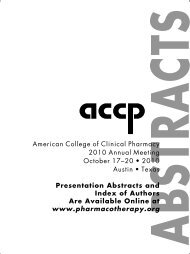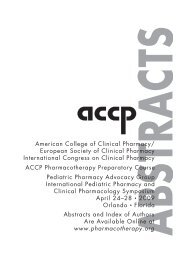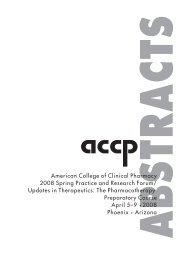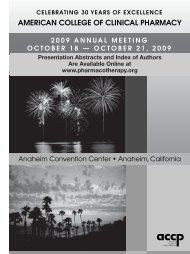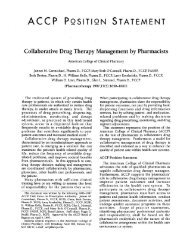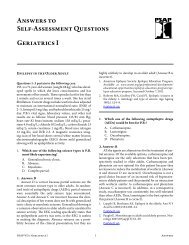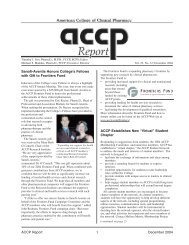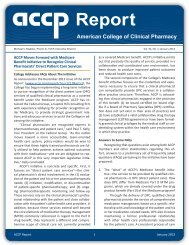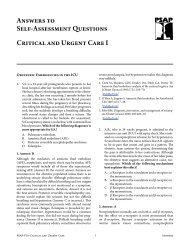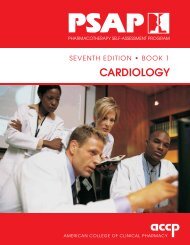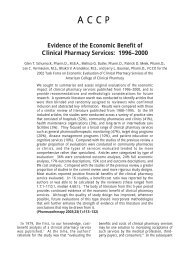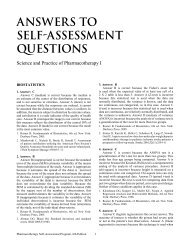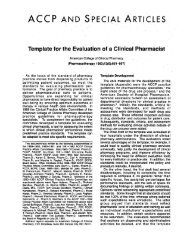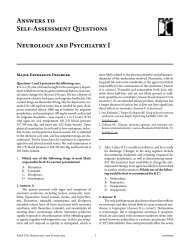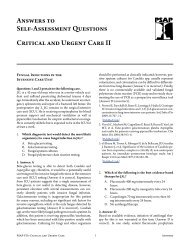Answers to Self-Assessment Questions - ACCP
Answers to Self-Assessment Questions - ACCP
Answers to Self-Assessment Questions - ACCP
Create successful ePaper yourself
Turn your PDF publications into a flip-book with our unique Google optimized e-Paper software.
Dietary Supplements<br />
61. Answer: B<br />
Information regarding the safety and efficacy of dietary<br />
supplements must be communicated <strong>to</strong> the consumer by<br />
pharmacists. Although the Federal Trade Commission<br />
(FTC) rather than the FDA regulates advertising of dietary<br />
supplements (Answer A), this fact is not helpful <strong>to</strong> the<br />
consumer making decisions regarding whether use of such a<br />
supplement is safe and efficacious, and Answer A is incorrect.<br />
Although structure and function claims on the labels of<br />
dietary supplements must be followed by a disclaimer that<br />
the claim has not been evaluated by the FDA (Answer C),<br />
this information mainly addresses efficacy (or lack thereof)<br />
of dietary supplements rather than safety, and Answer C is<br />
incorrect. Although it is now mandated that manufacturers<br />
follow Good Manufacturing Practices (GMPs) as indicated<br />
in Answer D, these address only whether the product<br />
ingredients are consistent with the labeling and ensure that<br />
the product is free of contaminants; GMPs do not address<br />
the efficacy of dietary supplements, making Answer D<br />
incorrect. Informing the consumer that dietary supplements<br />
are regulated more like foods than conventional drugs and<br />
that they do not require premarketing approval by the FDA<br />
(Answer B) should alert them that safety and efficacy could<br />
both be issues with use of the product, making Answer B<br />
correct.<br />
1. Dietary Supplement Current Good Manufacturing Practices<br />
(CGMPs) and Interim Final Rule (IFR) Facts. U.S. Food and<br />
Drug Administration Center for Food Safety and Applied<br />
Nutrition. June 22, 2007. Available at www.cfsan.fda.gov/~dms/<br />
dscgmps6.html. Accessed April 10, 2009.<br />
2. Overview of Dietary Supplements. U.S. Food and Drug<br />
Administration Center for Food Safety and Applied Nutrition.<br />
January 3, 2001. Available at www.cfsan.fda.gov/~dms/dsoview.html#regulate.<br />
Accessed April 10, 2009.<br />
62. Answer: A<br />
The Dietary Supplement Health and Education Act<br />
(DSHEA) of 1994 defined dietary supplements <strong>to</strong> include<br />
vitamins, minerals, herbs or other botanicals, amino acids,<br />
and other dietary substances that supplement the diet by<br />
increasing <strong>to</strong>tal dietary intake. In this case, the patient’s<br />
supplements all fall in<strong>to</strong> one of these categories (folic acid<br />
and ascorbic acid [vitamin C] are vitamins, glucosamine<br />
falls under “other dietary substances,” and ginkgo and green<br />
tea extracts are herbs), making Answer A correct. Answer B<br />
does not include green tea and therefore implies that green<br />
tea extract is not regulated by DSHEA, something that would<br />
be correct if the patient were consuming commercially<br />
available green tea rather than the extract; thus, Answer B is<br />
incorrect. Answer C does not include glucosamine, implying<br />
that it is not regulated by DSHEA; this is incorrect, and<br />
Answer C is not the best answer. Even though glucosamine<br />
is not derived from an herbal source, it is a natural product<br />
that falls in the “other dietary substances” category. Folic<br />
acid in dosages greater than 0.8 mg/day was regulated as<br />
a prescription drug before DSHEA. However, since 1994,<br />
folic acid dosages greater than 0.8 mg/day are considered<br />
dietary supplements and may be sold without a prescription.<br />
Therefore, Answer D, which indicates that folic acid 1 mg is<br />
not regulated by the DSHEA, is incorrect.<br />
1. Overview of dietary supplements. U.S. Food and Drug<br />
Administration Center for Food Safety and Applied Nutrition.<br />
January 3, 2001. Available at www.cfsan.fda.gov/~dms/dsoview.html#regulate.<br />
Accessed April 10, 2009.<br />
2. FDA/CDER Drug Info. Personal communication. May 9, 2008.<br />
Mailed <strong>to</strong>/from: DRUGINFO@fda.hhs.gov. Accessed Oc<strong>to</strong>ber<br />
31, 2008.<br />
63. Answer: C<br />
Ephedra was finally removed from the market as a<br />
weight loss drug by the FDA because it was shown <strong>to</strong><br />
cause a significant risk of injury (Answer C); thus, Answer<br />
C is correct. Although the FTC can levy fines for false<br />
advertising, it cannot require that a product be removed from<br />
the market (Answer A); thus Answer A is incorrect. Under<br />
DSHEA, dietary supplements do not have <strong>to</strong> be shown <strong>to</strong><br />
be effective either before or after marketing, thus Answer<br />
B (the FDA removed ephedra from the market because of<br />
ineffectiveness) is incorrect. Ephedra can no longer be sold<br />
as a dietary supplement in the United States; thus Answer D<br />
(ephedra may still be sold as a dietary supplement but not as<br />
a nonprescription drug) is incorrect.<br />
1. Overview of dietary supplements. U.S. Food and Drug<br />
Administration Center for Food Safety and Applied Nutrition.<br />
January 3, 2001. Available at www.cfsan.fda.gov/~dms/dsoview.html#regulate.<br />
Accessed April 10, 2008.<br />
2. Federal Trade Commission. Dietary claims: an advertising<br />
guide for industry. Available at www.ftc.gov/bcp/conline/pubs/<br />
buspubs/dietsupp.shtm. Accessed April 10, 2009.<br />
64. Answer: D<br />
The GMPs apply <strong>to</strong> both domestic and foreign<br />
manufactured dietary supplements. These long-awaited rules<br />
help ensure the identity, purity, strength, and composition of<br />
dietary supplements and thus will help prevent adulterated<br />
products from reaching the market, making Answer D<br />
correct. Although the GMPs should help promote the safety<br />
of these products, the rules do not require safety testing in<br />
animals or humans (Answer A is incorrect). Similarly, the<br />
GMPs do not address efficacy, so Answer B is incorrect.<br />
No tariffs are levied on foreign products related <strong>to</strong> the GMP<br />
(Answer C is incorrect); however, implementation of these<br />
new rules will be costly, especially for small companies, and<br />
this may drive up prices of some supplements.<br />
1. U.S. Food and Drug Administration. Dietary supplement<br />
current good manufacturing practices (CGMPs) and interim<br />
final rule (IFR) facts (fact sheet). June 22, 2007. Available at<br />
www.cfsan.fda.gov/~dms/dscgmps6.html. Accessed April 10,<br />
2009.<br />
2. Current good manufacturing practice in manufacturing,<br />
packaging, labeling, or holding operations for dietary<br />
supplements, final rule (21 CFR part 111). Federal Register.<br />
June 25, 2007;72:34751. Available at www.cfsan.fda.gov/~lrd/<br />
fr07625a.html. Accessed April 10, 2009.<br />
65. Answer: B<br />
J.H., a 35-year-old obese woman with mild osteoarthritis,<br />
would like advice on using green tea for weight loss.<br />
Some clinical studies of green tea have demonstrated<br />
benefit in promoting weight loss and weight maintenance,<br />
whereas others have not. Because of the benign nature of<br />
the therapy, especially in patients without hypertension<br />
Pharmacotherapy <strong>Self</strong>-<strong>Assessment</strong> Program, 6th Edition 49 Gastroenterology and Nutrition <strong>Answers</strong>



